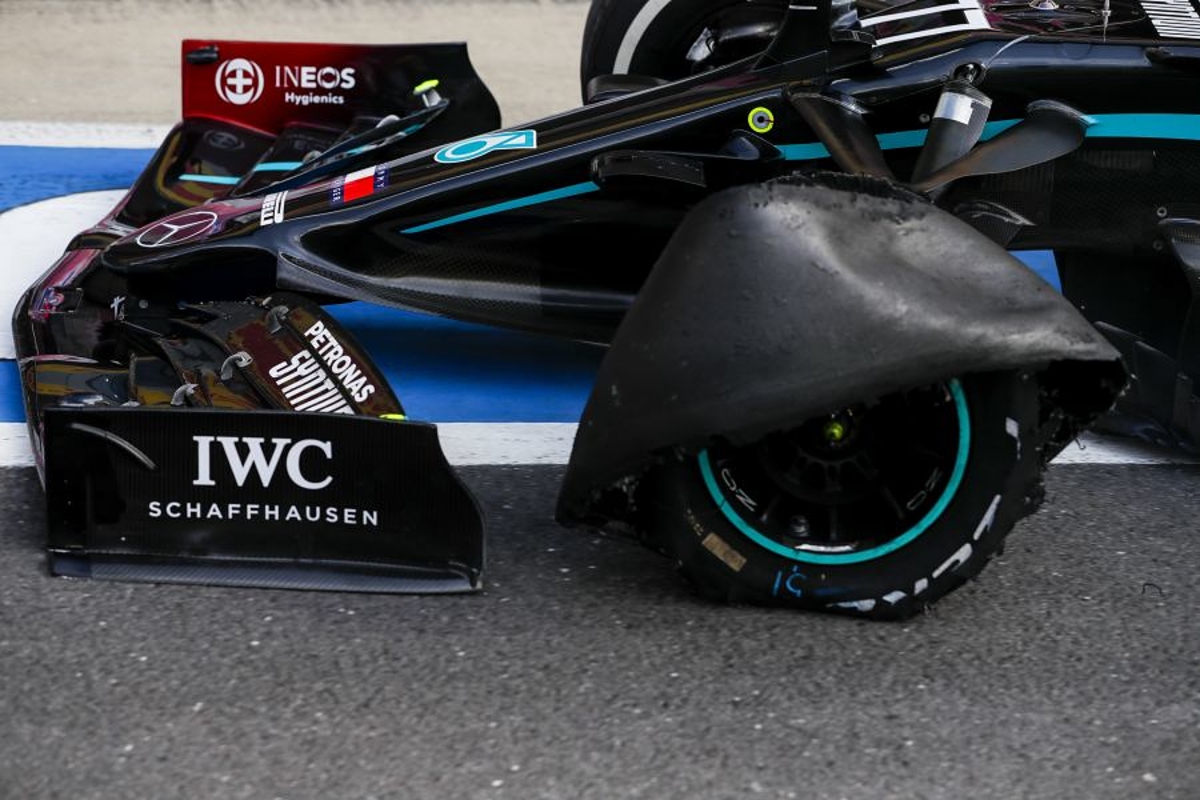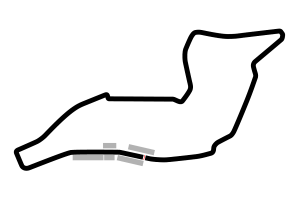Pirelli has concluded that wear was the root cause of the failures witnessed during the British Grand Prix as a result of "the biggest forces ever seen on tyres generated by the fastest Formula 1 cars in history".
The trio of failures to Mercedes duo Lewis Hamilton and Valtteri Bottas, along with McLaren's Carlos Sainz, occurred on each of the final three laps of the race at Silverstone.
Bottas was cruising to a comfortable second place when his front-left tyre delaminated early on lap 50, an incident that led to the Finn finishing outside of the points in 11th.
It was a similar situation for Sainz who was on course for fifth place when he suffered a repeat of Bottas' failure a lap later, leaving him to drop down the order to 13th.
Then halfway into the final lap, Hamilton's front-left also failed, resulting in him taking the chequered flag on three wheels.
All three drivers had taken on the hard tyre on lap 12 of the race following a high-speed crash involving AlphaTauri's Daniil Kvyat at Maggotts.
The fact the cars then ran for almost 40 laps, and given the increase in load due to the high speeds of today's F1 cars were all contributory factors.
Explaining what unfolded, via a statement, Pirelli said: "The key reason is down to a set of individual race circumstances that led to an extremely long use of the second set of tyres.
"The second safety car period prompted nearly all the teams to anticipate their planned pit stop and so carry out a particularly long final stint: around 40 laps, which is more than three-quarters the total race length on one of the most demanding tracks of the calendar.
"Combined with the notably increased pace of the 2020 Formula 1 cars [pole position was 1.2 seconds faster compared to 2019] this made the final laps of the British Grand Prix especially tough, as a consequence of the biggest forces ever seen on tyres generated by the fastest Formula 1 cars in history.
"The overall result was the most challenging operating conditions for tyres. These led to the front-left tyre [which is well-known for working hardest at Silverstone] being placed under maximum stress after a very high number of laps, with the resulting high wear meaning that it was less protected from the extreme forces in play."
Pirelli has confirmed it has no intention of making changes to the tyres to be used for this weekend's 70th Anniversary Grand Prix when the three compounds will all be a step softer, but there will be a prescription alteration.
Pirelli added: "For the second race at Silverstone this weekend, Pirelli confirms the nominated compounds: C2, C3, and C4, being one step softer than those seen at the last GP.
"Also, the usage prescription will be reviewed, increasing the minimum tyre pressures to reduce the stress on the construction."
Before you go...
F1 teams given just one 90-minute practice session at Imola
Ferrari suffer "very sizeable" financial hit "in high tens of millions"
Related

















































 Grand Prix du Canada 2025
Grand Prix du Canada 2025  Grand Prix of Austria 2025
Grand Prix of Austria 2025  Grand Prix of Belgium 2025
Grand Prix of Belgium 2025  Grand Prix of Hungary 2025
Grand Prix of Hungary 2025  Grand Prix of Azerbaijan 2025
Grand Prix of Azerbaijan 2025  Grand Prix of Singapore 2025
Grand Prix of Singapore 2025  Gran Premio de la Ciudad de Mexico 2025
Gran Premio de la Ciudad de Mexico 2025  Grande Prêmio de São Paulo 2025
Grande Prêmio de São Paulo 2025  Qatar Grand Prix 2025
Qatar Grand Prix 2025  Grand Prix of Abu Dhabi 2025
Grand Prix of Abu Dhabi 2025 